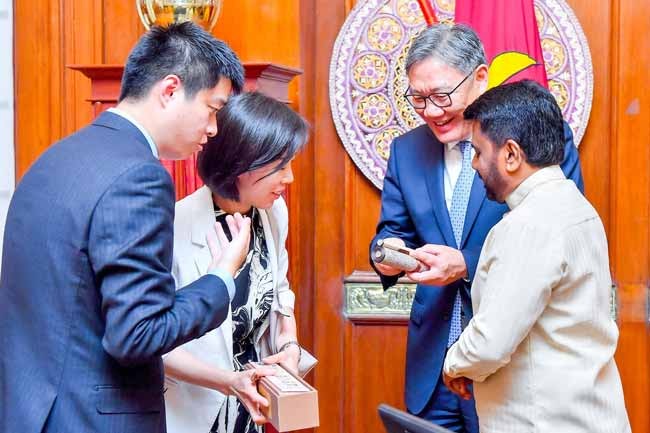-By LeN Diplomatic Correspondent

(Lanka-e-News -29.May.2025, 11.30 PM) In the marble corridors of the Presidential Secretariat, where portraits of past statesmen look on with unblinking eyes, Sri Lanka’s President Anura Kumara Dissanayake greeted China’s Commerce Minister, Wang Wentao, on the afternoon of May 29th. It was an encounter that carried all the ceremonial weight of a state visit—and yet beneath the pomp lay a pragmatic message: Beijing’s trust in Colombo has never been greater, thanks to what Minister Wang described as “a new era of transparent governance.”
Protocol dictated the ceremonial fanfare: the Presidential Guard’s red-tipped pikes, the fluttering national flags of both nations, and the discreet humming of press cameras capturing every handshake. Yet it was Minister Wang’s opening remarks that set the tone for what could prove to be Sri Lanka’s economic watershed moment.
“Under President Dissanayake’s leadership,” he began, “Sri Lanka has charted a course of stability and openness that inspires confidence.” His carefully chosen words—stability, openness, confidence—were not mere diplomatic platitudes. They conveyed to the 100-strong delegation of entrepreneurs, financiers, and technologists that Sri Lanka’s boardrooms are now as transparent as its newly audited budgets.
Sri Lanka’s journey to this juncture has not been straightforward. Only a few years ago, concerns over fiscal deficits and governance lapses made foreign investors wary. But a slate of reforms—most notably e-procurement mandates, public disclosure of government contracts, and the empowerment of an independent anti-corruption commission—has gradually dismantled the old structures of opacity.
In response, China has shifted from being a wary observer to an active partner. As one senior Sri Lankan diplomat observed, “Where once China hesitated, it now steps forward.”
The minister’s entourage read like a Who’s Who of China’s corporate elite. Delegates from China State Construction Engineering Corporation huddled with Sri Lankan transport planners; representatives of Alibaba’s Ant Group discussed fintech pilot schemes with local banks; and venture capitalists from Beijing’s Zhongguancun innovation hub scouted Colombo’s burgeoning tech startups. Even the heads of China National Offshore Oil Corporation and Huawei’s Ceylon arm undertook side conversations with their Sri Lankan counterparts, eyeing opportunities in energy infrastructure and 5G networks.
The symbolic import of their presence was not lost on local business chambers. At a luncheon hosted by the Confederation of Employers, one Colombo investor quipped, “We have 100 reasons to be optimistic—but let’s hope they bring 1,000 contracts instead.”
No conversation about China’s external engagements is complete without reference to the Belt and Road Initiative (BRI). Yet, in yesterday’s discussions, the narrative shifted. Rather than framing Sri Lanka as a strategic chokepoint in a Sino-centric network, both leaders emphasised collaborative development that respects national priorities.
President Dissanayake reaffirmed the commitments made during his Beijing visit, listing the projects awaiting expeditious completion: the Colombo–Hambantota rail upgrade, Trincomalee’s expanded special economic zone, and the Monaragala solar energy park. His pledge to institute real-time public dashboards—where citizens can track project milestones and expenditures—elicited nods of approval from Minister Wang.
Global markets, of course, remain unpredictable. European inflationary pressures, a cautious US Federal Reserve, and China’s own economic recalibration have injected an air of caution into investment decisions worldwide. Against this backdrop, Sri Lanka’s transparent governance has become its most potent asset.
In a pointed aside, Minister Wang noted, “China’s commitment to Sri Lanka is unwavering, but support must be anchored in accountability.” Though couched in diplomatic courtesy, the remark served as a reminder that future financing—whether concessional loans or commercial credit—will be contingent upon Colombo’s continued adherence to reform.
For his part, President Dissanayake struck an optimistic note: “We welcome China’s support in infrastructure and industry, provided it aligns with our national vision of sustainable growth.” He emphasised that any new agreements would be subject to parliamentary oversight and community consultations, a safeguard he said was essential to ensure projects deliver local benefits.
Infrastructure may be the most visible facet of Sino–Sri Lankan ties, but yesterday’s agenda explored less conventional domains. A memorandum in principle was reportedly signed to establish a Colombo Technology Transfer Centre, designed to accelerate the adoption of Chinese advancements in electric vehicles, battery storage, and smart-grid solutions.
Simultaneously, discussions took place on a scholarship programme that would send Sri Lankan postgraduate students to Chinese universities in fields ranging from marine ecology to artificial intelligence. In return, Chinese scholars would be invited to teach and conduct research in Sri Lanka, with a focus on agricultural technologies suitable for the island’s climatic conditions.
The net effect: a vision of bilateral cooperation that transcends port terminals and highways, venturing instead into human capital development and knowledge exchange.
The coming months will test the resilience of this newly minted trust. Watch for the first installment of solar panels at Monaragala, the inaugural bullet train from Colombo to Hambantota, and the debut Ceylon tea exposition at Shanghai’s Convention Centre. These will be the real indicators of progress—footnotes in a diplomatic narrative that began with words, but must be validated by deeds.
For now, Sri Lanka stands at a precipice: a chance to transform governance rhetoric into tangible growth, to harness foreign investment without sacrificing sovereignty, and to show that transparent administration is not merely a domestic virtue but an asset in global partnerships.
In the final analysis, China’s renewed gaze upon this island nation speaks volumes—not of borrowed confidence, but of earned credibility. And for a country long buffeted by external pressures, that may be the greatest investment of all.
-By LeN Diplomatic Correspondent
---------------------------
by (2025-05-29 18:48:36)
Leave a Reply